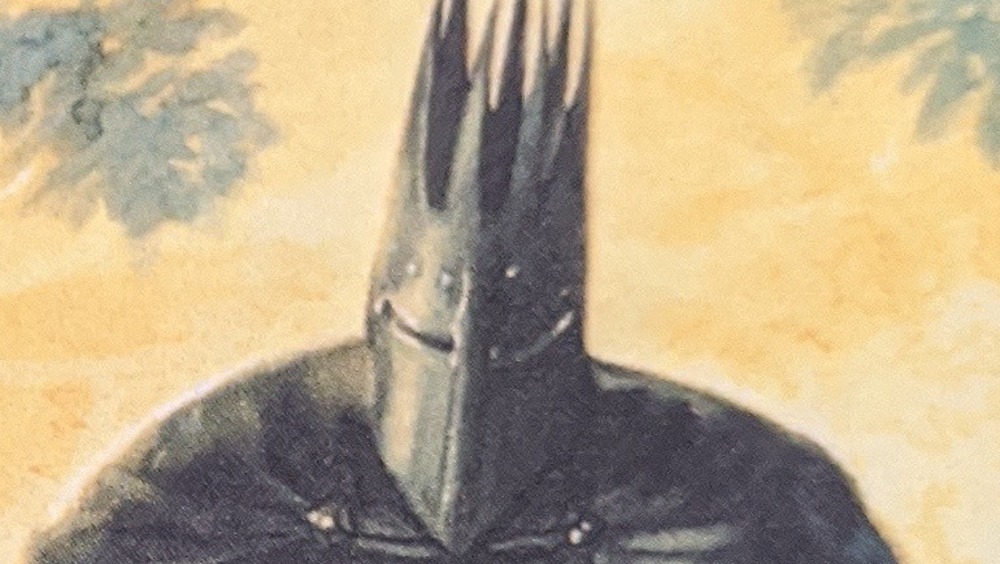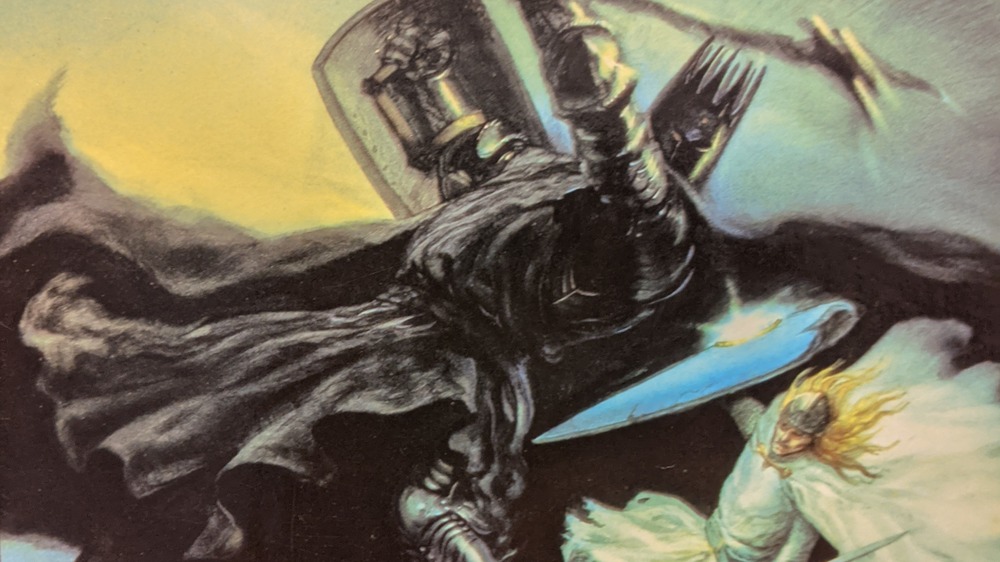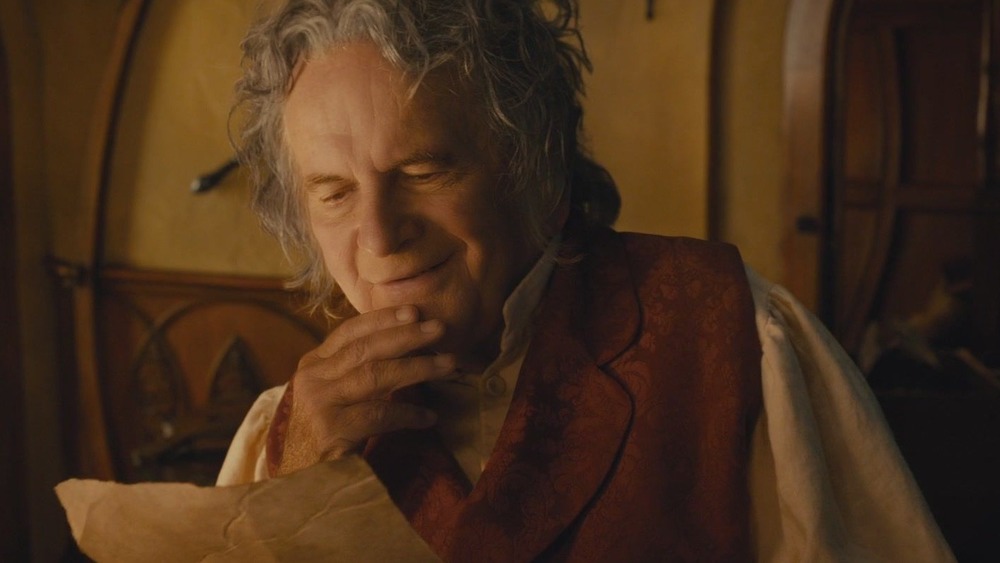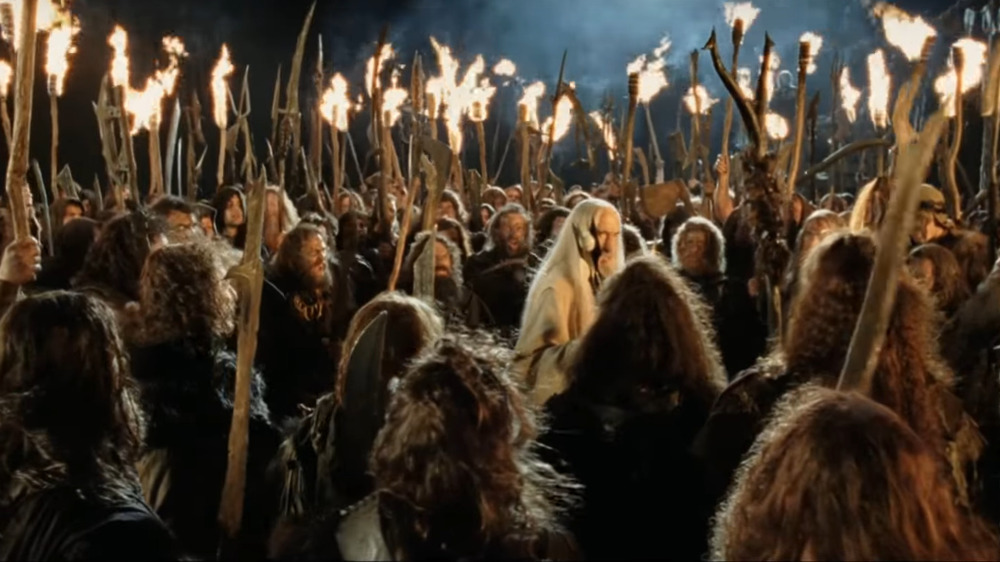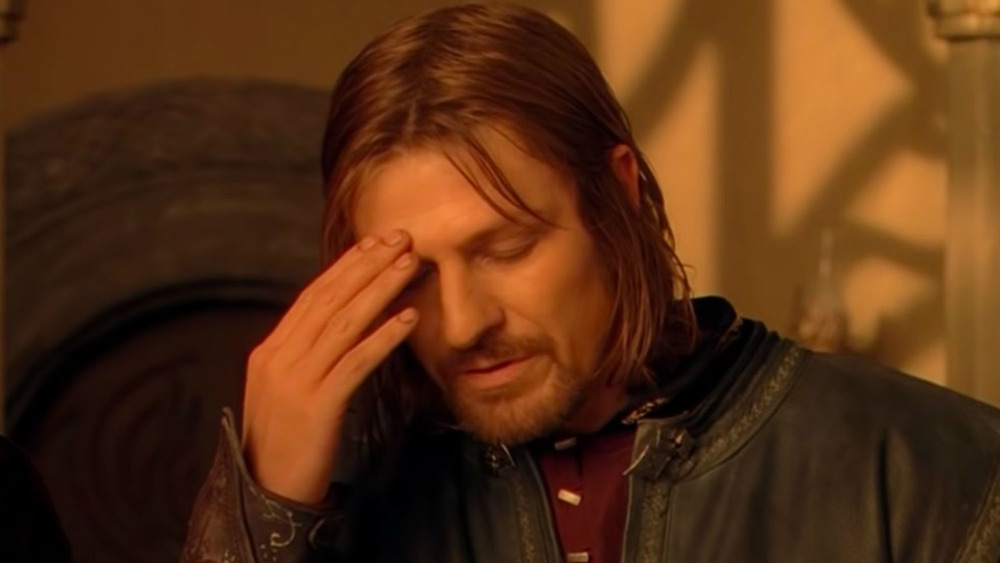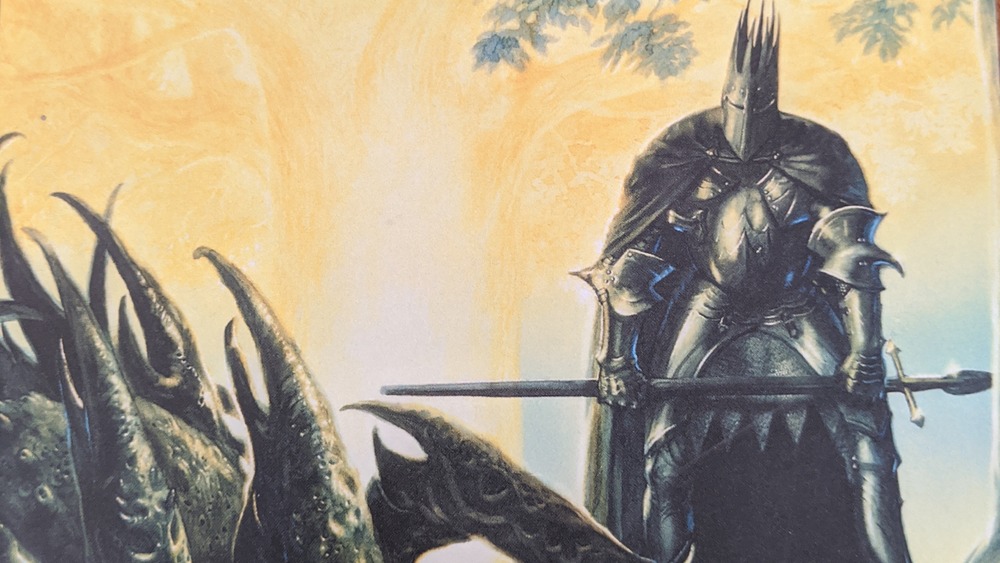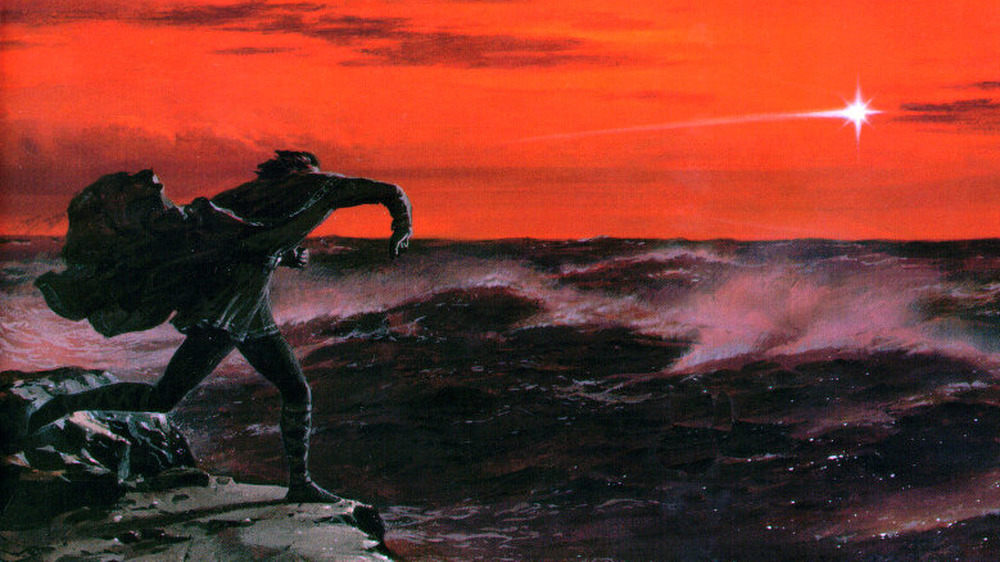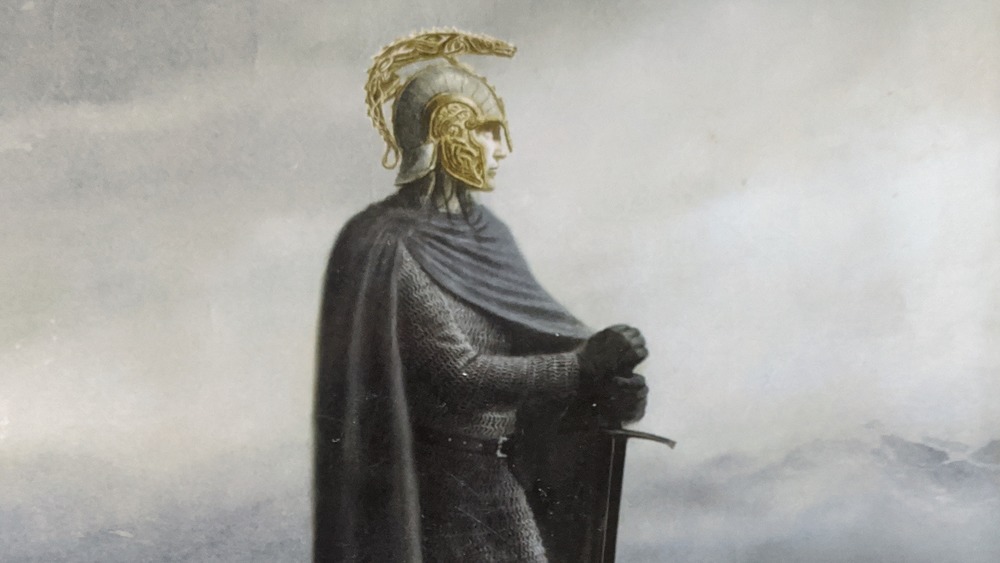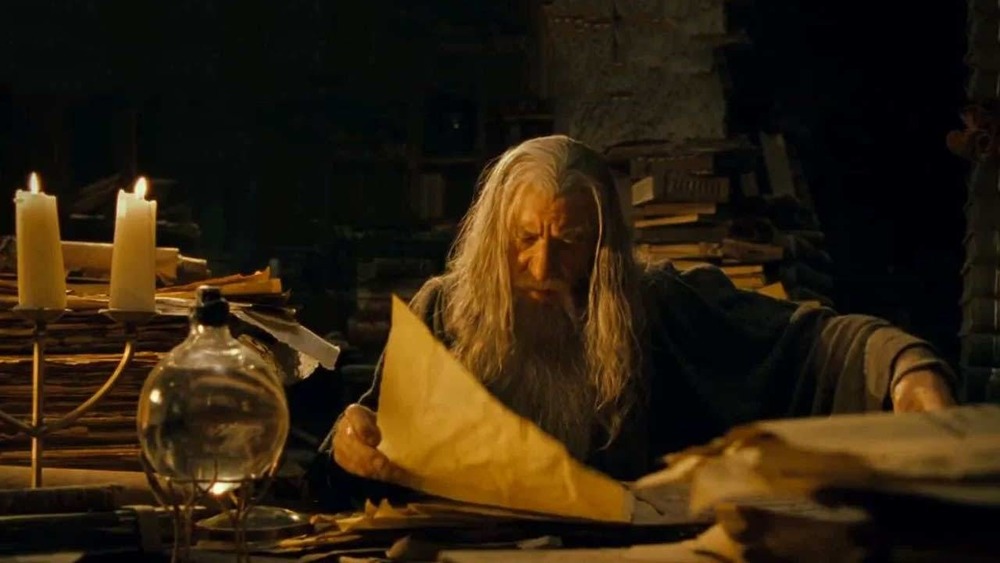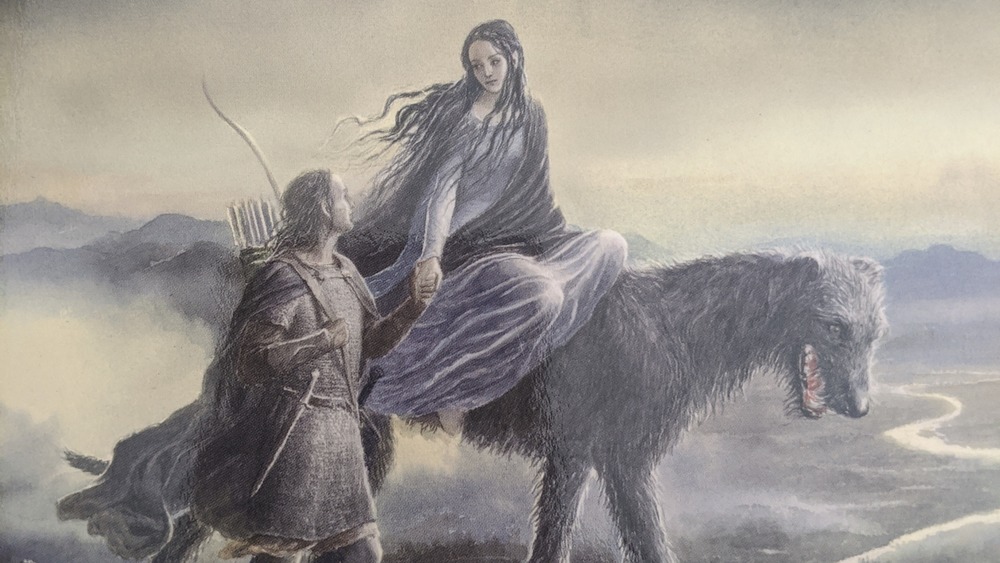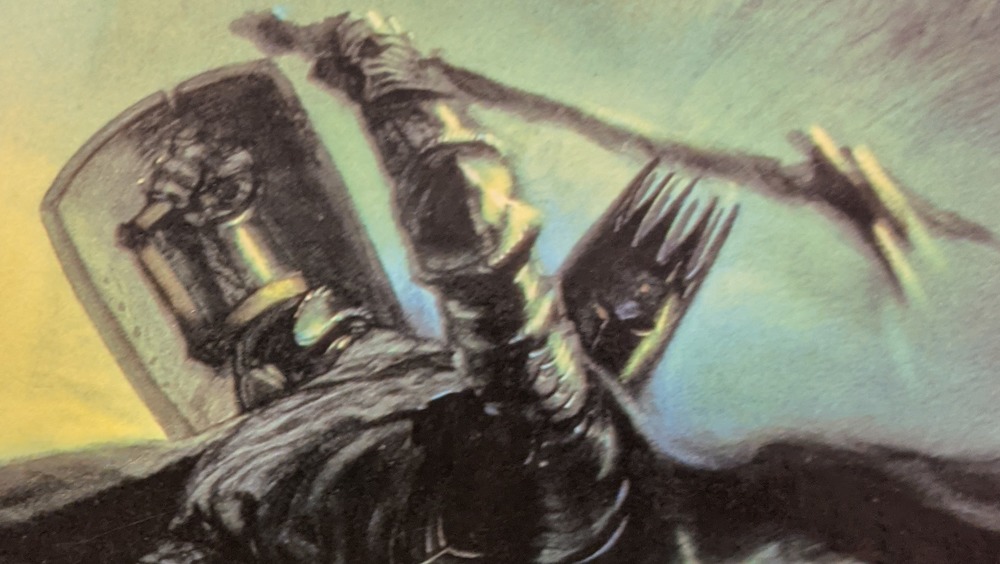The Lord Of The Rings: Why A Movie About Morgoth Is A Really Bad Idea
The Hobbit and The Lord of the Rings were first adapted for film in the 1970s, before Peter Jackson took things to a whole new level three decades later with his monumental trilogy of Tolkien films. This was followed by a couple of (admittedly fun) fan fiction projects and the drawn-out trifecta of Hobbit movies. The main theme that tied these early adaptations together was the fact that they were all set in the Third Age of Middle-earth history.
Then Amazon came along and bought the rights to produce a Middle-earth show. The defining difference? It would be set in the Second Age of Tolkien's mythos. Even with Amazon breaking new ground in Middle-earth, though, the studio still didn't dare go all the way back to the First Age — an epic time that makes the events of LotR feel like child's play.
Nevertheless, the deviation from the well-known Third Age opened the doors. Eventually, rumors started to circulate that movies were being planned about the First Age — in particular Sauron's predecessor, the Dark Lord Morgoth. It's easy to see why a movie about Morgoth would sound incredibly awesome on the surface, but truth be told, there are actually a lot of reasons that a project of that nature would be a really — and we mean a really — bad idea.
Who the heck is Morgoth?
Before we get too far in the weeds, it's worth explaining who the heck Morgoth is in the first place. Even fans of the Lord of the Rings books don't know much about the mysterious villain. However, those who have read The Silmarillion know the original arch-nemesis of Middle-earth only too well.
Morgoth is the original bad guy in J.R.R. Tolkien's mythos. He spearheads a revolt against Illúvatar, the godlike creator of the world, and ultimately descends into the world with mischief, corruption, and destruction on his mind. Throughout the earlier periods of Middle-earth history, he repeatedly shows up as the primary enemy of the angelic guardians of the world known as the Valar.
These initial quarrels with Morgoth drag on for tens of thousands of years until they culminate in the five-hundred-year-long First Age. At this point, the focus shifts as the Dark Lord squares off against Elves and Men, destroying many of them in the process. Eventually, Morgoth is overthrown and exiled during the War of Wrath. After his downfall, the Second Age begins. Morgoth's second in command — a dude named Sauron, ever heard of him? — ends up taking over as the new Dark Lord and the rest is history.
From beginning to end, Morgoth is about as epic as they come. The question is, is a visual adaptation of the larger than life villain — or of early Middle-earth history as a whole, for that matter — a good idea? We posit that it isn't. Here's why.
Morgoth comes with rights issues
Most fans of Tolkien's works are aware that the Tolkien estate doesn't sell the rights to the author's works very willingly. Even when Amazon dropped a cool quarter of a billion (that's billion with a "b") on the rights, they apparently didn't get permission to use the First Age.
This naturally raises the question: What would it cost to gain access to the First Age source material? Is it even for sale? If Amazon can't have it, who can? This is ground zero for why a Morgoth movie — or any movie set in the First Age — simply wouldn't work. The rights aren't floating out there for anyone to scoop up and use. They're safely locked up with the author's estate.
This has been the case ever since the First Age material was published, and it doesn't seem likely to change any time soon. If that were to happen, fans could bet their bottom dollar that a Morgoth movie would be announced alongside an even bigger story about how many zeros were associated with the acquisition of the rights.
It's impossible to please the fans
There's an even greater (though more subtle) barrier to entry that must also be considered when trying to create a First Age film: the fans. Tolkien's fanbase is large, vocal, and fiercely loyal to their beloved Middle-earth. They don't take well to tampering with the original material, and when that does happen, they let everyone know about it. On top of that, many never want to see the First Age (or Second Age, for that matter) adapted, due to the complexities involved.
The Lord of the Rings and Hobbit trilogies are perfect examples of this intense fandom in action. On one hand, Peter Jackson's LotR project was so mind-bogglingly huge that it was difficult to hate on it much. Diehard critics aside, few would argue that the movies gave Middle-earth anything but the red carpet treatment.
On the other hand, The Hobbit films took a more laissez-faire approach to Middle-earth, cobbling together a trio of films that were saturated with CGI and loaded with random additional content. The excess was immediately apparent, and the fans responded with a lukewarm — if not cold — shoulder. The lesson here is obvious. Unless a movie about Morgoth was phenomenally well made, it would likely rub fans the wrong way. And if there's anything you don't want to do, it's upset your fanbase (we're looking at you, eighth season of Game of Thrones).
The Silmarillion is archaic
Fans of the Lord of the Rings movies are already aware of the immense complexities that Tolkien wove into his world. The verbiage that the characters use is particularly disorienting at times. Take Boromir's line that "long has my father, the steward of Gondor, kept the forces of Mordor at bay," or Saruman stating that "the hour grows late." No matter where you are in Middle-earth, the language is hardly going to jive with our 21st century vernacular.
These wordy, archaic overtones are only amped up in the books. And The Silmarillion? That takes the complex sentence structures and ancient word choices and makes them even more confusing. Needless to say, most of the dialogue and descriptions would sound downright baffling if they were used verbatim in a modern script.
Of course, you could always change the lines for an up-to-date adaptation, But that option is risky at best. Much of the grandeur that makes The Silmarillion so epic comes from the way it's written. If you changed the high-minded words to make them more relatable, all it would do is deflate the awe of the entire Morgoth experience. Seriously messing with the tone in that manner wouldn't just hurt the story, either. It would also anger a lot of diehard fans in the process.
Morgoth's era is too poetic for the silver screen
Even if you could manage to work around some of the more archaic word choices, adapting a Silmarillion movie would still be challenging due to the poetic nature of so much of the story. Believe it or not, The Lord of the Rings tends to be a fairly grounded, prosaic part of Middle-earth history. It's filled with relatable characters that tackle physically understandable tasks.
Not so in the First Age. Sure, there are journeys and battles and conversations, but often the activities taking place are written in a manner that defies visual explanation. Take, for instance, the War of Wrath. The final catastrophe of the First Age includes a point in the fight when a hero in a flying wooden ship duels a monstrously huge dragon in the sky.
The poetic theatrics don't stop there, either. At an earlier point in the story, Morgoth fights a very one-sided duel with an Elf king that is a fraction of his size ... and is wounded seven times before he manages to kill the troublemaker. Another battle starts with rivers of fire literally pouring out of Morgoth's mountainous stronghold. A pair of heroes also wear wolf and bat skins in order to "blend in" to Morgoth's army. Well-sung songs put entire kingdoms to sleep. The examples just keep on coming.
The point is, many of the events that take place around the original Dark Lord simply wouldn't translate well to the screen.
A documentary would be a better fit
It may sound lame on the surface, but the truth is, the First Age of Middle-earth is more docudrama material than anything else. Unless you're going to bore down into one of the mini-tales or sub-stories that Tolkien sprinkles throughout The Silmarillion, the timeline is simply too broken up and scattered to turn into a grand cinematic epic. Instead, it tends to feel like a Ken Burns documentary, skimming along with the primary narrative and occasionally stopping to focus on a larger detail.
This cursory feel to many of the events leaves countless gaps and tends to make a fluid narration nearly impossible. A movie would either need to skip from one event to the other (often with centuries in between) or it would need to fill in gaps — something that wasn't received very well in the Hobbit trilogy.
Even if a movie focused on the fall of Morgoth in particular, it would still cover decades of time. The event is a slow, drawn-out process that involves countless splintered storylines, none of which can be skipped over or left out without impacting the larger story. Trying to mash everything together into a flowing narrative would be flat out impossible.
Tolkien never finished the story
One of the most interesting things about The Silmarillion is that it wasn't published during Tolkien's lifetime. While the author desperately wanted to get it into the hands of his fans, he struggled with pulling together a version of the book that he felt was worthy of publication. After his death, his son Christopher stepped in and completed the manuscript — which required weaving a fair number of independent stories together in a somewhat disjointed manner.
Many of these stories, like Beren and Lúthien and the Children of Húrin (both of which are well worth reading) could be turned into feature films on their own. Morgoth also plays critical roles in most of these tales, especially the two mentioned above. At times he even has lines already written and ready to go.
That said, these are stories that only cover a handful of years each time, tracing the lives and deeds of individual Men, Women, and Elvish heroes. Throughout them, Morgoth kind of just lurks on the edges, occasionally popping in to terrify the living daylights out of everyone and then receding to the background again. While this works well for the broken up stories on their own, it doesn't lend itself well to a movie that would supposedly trace the story of Dark Lord himself.
Time is an issue
Another concern that we've already touched on briefly is that of time. Middle-earth adaptations already have to grapple with the issue of pacing the activity of immortal beings like Elves and wizards. It's a problem that has already arisen with the Amazon Studios project, which has had to recast ageless characters like Galadriel and Elrond.
When it comes to Morgoth, though, the time concerns are even greater. Not only is the Dark Lord immortal, but he's a spirit, too. This means his story stretches way back in time to before Middle-earth was even created. To complicate things even further, several of his greatest moments take place with short-lived Men, forcing his story to slow down to a mortal crawl.
Even if you were able to find a way to get past all that, the Silmarillion timeline doesn't flow like The Lord of the Rings. On the contrary, Frodo Baggins' entire journey takes place inside a year. This gives Jackson's trilogy a nice, easy pacing as the weeks and months of the story go by. In contrast, The Silmarillion will cover tens of thousands of years in a paragraph and then take multiple pages to break down a single day. The stop and start nature of Morgoth's timeline is anything but elegant.
The exposition would be enormous
A movie about Morgoth would necessarily focus on the villain as he tussles with various kingdoms and comes face to face with individual adversaries — of which there are legion. From the hidden kingdom of Gondolin to indomitable outlaws like Beren and Túrin Turambar, Morgoth is constantly interacting with completely different — and only occasionally connected — individuals.
A movie that tries to follow the Dark Lord throughout his various Middle-earth machinations would be loaded with exposition. From the moment Morgoth arrived on Middle-earth and began interacting with his Valar counterparts, the explanations would need to begin. Elves, Dwarves, and Men would gradually appear out of nowhere. Kingdoms would rise and fall in a repeating cycle. Immortal heroes would join with mortal allies... and then outlive them and still continue to fight the Dark Lord for generations.
There would be so much to explain as the movie went along that it would be absurd. It's the kind of situation that would require a deep-voiced narrator constantly disrupting the flow of the story to explain why such and such character is important — right before Morgoth killed them off anyway.
The characters aren't relatable
While timing, flow, and knotty verbiage are all major factors, the greatest flaw at the heart of the Morgoth movie idea is the fact that most of the characters from The Silmarillion aren't relatable. This isn't their fault. When the book does go into further detail with stories like Beren and Lúthein, the characters are much more approachable. For the most part, though, the story is filled with personalities that would be very difficult to flesh out for the screen.
In contrast, The Lord of the Rings has characters that are intensely relatable. It's easy to understand and commiserate with Hobbits in particular. Not so with the First Age. It's filled with characters that are unreachable and otherworldly. Angels war with demons. Elven kings build hidden kingdoms. Literal armies of Balrogs and dragons go to war.
And at the top of the heap is Morgoth, the vaguest and most mystifyingly horrific character of them all. And it kind of has to be that way, too. The guy is just too big for words. He's too supernatural and alien to reduce to a definable personality like Thanos or Saruman, and Tolkien didn't try. Everyone else should follow his lead.
